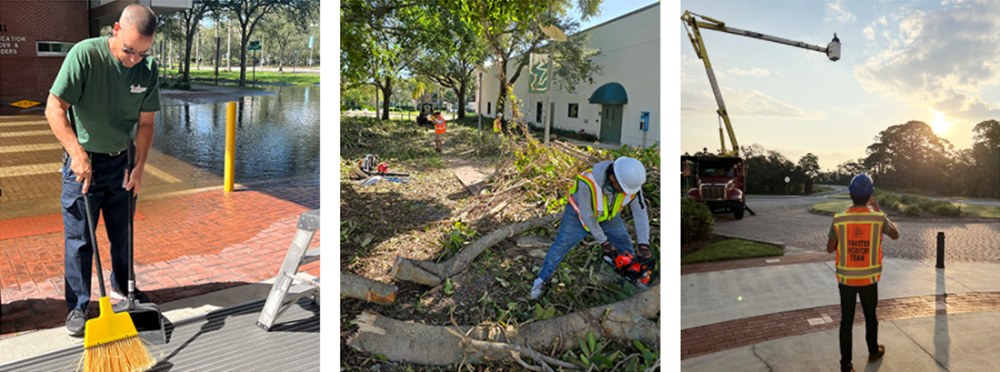How you can help
By Paul Guzzo, University Communications and Marketing
Danielle McDonald has the dubious distinction of being experienced in leading college students through hurricanes.
In 1992, she was a resident assistant at the University of Miami when Hurricane Andrew blew through campus.
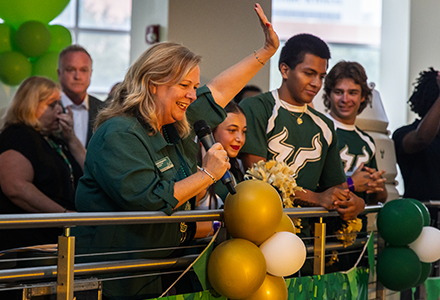
Danielle McDonald greets students during Week of Welcome
In 2005, she was dean of students at Georgia Tech when Hurricane Katrina sent 18 tornados through the western part of the Peach State.
And, as the current dean of students at the University of South Florida, McDonald was charged with protecting students during Hurricane Milton.
“It is going to take a while to recover, but I am proud that the university continues to show a commitment to our students, our faculty and our staff,” McDonald said.
USF began displaying that dedication days before the hurricane made landfall as a Category 3 at Siesta Key and then roared through the state.
“As soon as it was predicted to impact us, we got to work,” said Rob Marlowe, USF’s emergency management coordinator. “In this case, that was Sunday, October 6.”
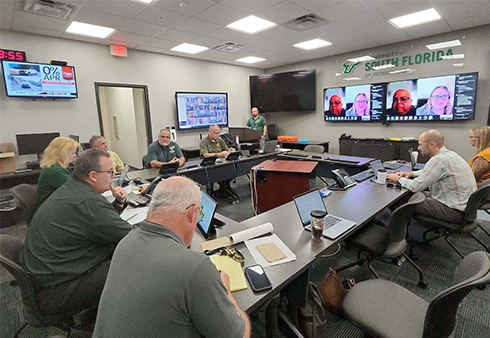
USF St. Petersburg Emergency Operations Center
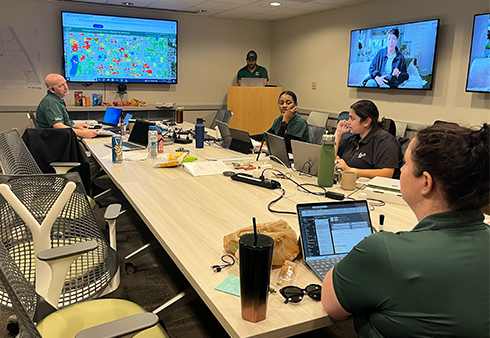
USF Tampa Emergency Operations Center
That’s when the university activated its emergency response team, made up of hundreds
of personnel, many working 12-hour shifts, from departments vital to the institution’s
continued operations before, during and after the storm.
“Think of it as a Model UN,” Marlowe said. “Each department is responsible for a specific area, and each has a representative. Our primary goal is information sharing and coordination between all emergency support functions so each has the resources they need to accomplish their own missions.”
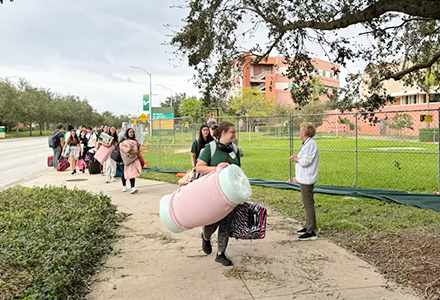
USF President Rhea Law greeted residential students as they departed the Tampa campus
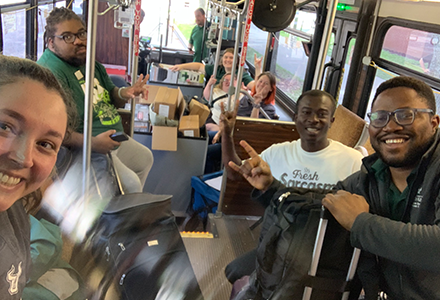
Students were transported to Jennings Middle School
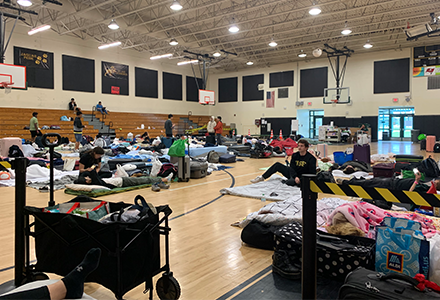
Jennings Middle School served as an evacuation shelter for USF students
That includes USF’s residence halls, which were evacuated on all three campuses. Teams
knocked on more than 3,000 doors to let remaining students know that they had to leave
the campuses and could go with university staff to a prepared shelter at Jennings
Middle School in Tampa.
“That desire to help stems from the top,” said Andrew Johnson, director of operations and outreach for Housing & Residential Education. “There's just a genuine care and compassion that emanates from leadership. We’re here to take care of each other. That’s what we do.”
Meanwhile, Phillip Ippolito, the utilities manager for Facilities Management, was busy leading the Tampa campus’ “ride-out team” that consisted of high voltage electrician Lonni Auston and plant operator William Hensel. Rather than riding out the storm at home on Wednesday night and Thursday morning, they volunteered to stay on campus.
“In a sense, we are first responders,” Ippolito said. “We need to recover the university’s critical systems as quickly and safely as possible. If we are at home, there is a risk that we will be unable to return to campus and recover these critical systems in a timely manner.”
After the storm passed, Ippolito and his team mobilized at about 6 a.m. to begin damage assessment and power up all utilities and plant systems.
The team found damage to streetlights, traffic signals and buildings and flooding across campus. Fortunately, nothing under their watch was severely damaged, in large part because the entire utilities team spent the prior days performing pre-storm preparations to all sensitive areas and ensuring they were as prepared as possible for what Hurricane Milton was to bring.
“There were trees and limbs everywhere,” said Jorge Fernandez, senior groundskeeper for the Tampa campus. “Some roads were blocked off.”
Using chainsaws and a vehicle reminiscent of a snowplow, his team began clearing roads and paths, while a custodial team began checking the campus buildings for damage and water intrusion.
“The extent of water intrusion was puddling here and there,” said Major Williams, a senior custodian on the Tampa campus. “We got the water up and ran carpet cleaners to take care of any potential mildew.”
The same efforts occurred throughout USF Health and USF Athletics facilities, as well as on the Sarasota-Manatee and St. Petersburg campuses, which was still dealing with impacts from Hurricane Helene when Hurricane Milton hit. The simultaneous efforts to finish cleanup efforts while preparing the St. Petersburg campus for the next storm resulted in an unprecedented emergency management team response.
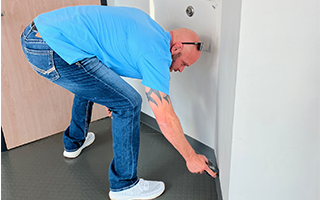
Crews checked for moisture in the walls
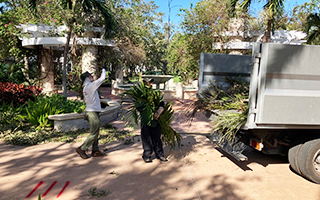
Clean-up crews removed a lot of debris
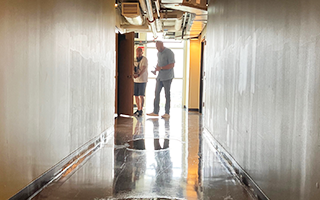
Flooding was reported in some buildings
Several members of the USF St. Petersburg team worked on campus nearly every day for weeks, from early morning into the night, under
challenging conditions. In the days leading up to back-to-back landfalls, Don Rogers,
manager of building and maintenance on that campus, went building to building to ensure
proper shutdown procedures. And when the storm passed, he was one of the first on
campus to assess damage.
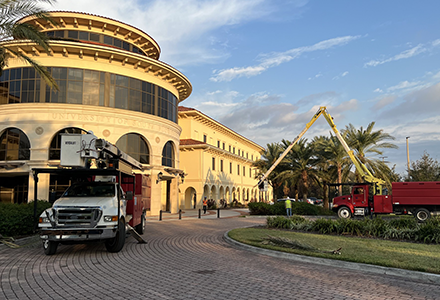
“Everybody was on the same page throughout this experience. Everybody on the team knew what they needed to do, and they did it,” Rogers said.
Despite wind gusts of more than 100 mph damaging the Sarasota-Bradenton International Airport’s terminal roof, remarkably, on the nearby USF Sarasota-Manatee campus, damage was less severe, including to the new six-story Campus Student Center and Atala Residence Hall. The building, which opened in August, was constructed of large precast concrete panels and windows designed to withstand 150 mph winds.
Once it was determined that the campuses were safe to reopen, students began returning the Sunday following the storm. The Marshall Student Center was converted into a “comfort center” for students living without power off campus.
“We provided water, air conditioning and internet,” said McDonald. “And the Hub Dining Hall allowed those students without dining plans to get food.”
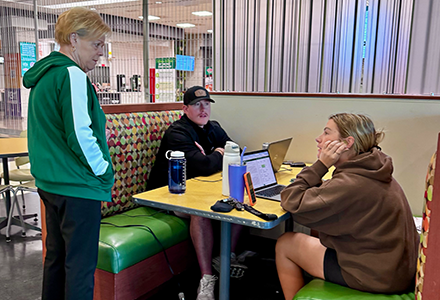
President Rhea Law checked on students at the Marshall Student Center
USF also activated a call center before and after the hurricane. Led by Madeleine Hershberger, faculty services administrator in the Office of the Provost and Executive Vice President, hundreds of employees volunteered from home and areas of refuge – answering more than 1,000 questions about campus operations, academic protocols and employee services.
USF also directed students and their families to university websites with assistance options for those whose housing, education, mental health or finances were impacted by the storm.
“We started an emergency grant disbursement,” McDonald said. “We have students who lost all their food. Some lost two weeks of pay because of Helene and Milton hitting back-to-back.”
Students have been helping with recovery efforts as well. The day after Hurricane Milton left Florida, USF junior Leila Sujanani drove from Spring Hill, where she evacuated, to the USF Botanical Gardens where she works as a staff assistant.
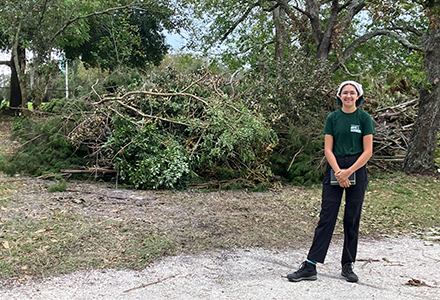
USF junior Leila Sujanani
“Half the gardens were underwater because the lake overflowed,” she said. “I was shocked, devastated.”
Decades-old black oak and cedar trees were uprooted and added to a mountain of fallen limbs. A wooden outlook platform that sat on land near the lake had been moved around 20 yards back. Three collections – the cactus and succulents, the wildflower meadow and the medicinal garden – were ruined.
But the following Wednesday, dozens of student volunteers descended on the garden to assist with the ongoing cleanup.
“This is a tough time,” Sujanani said. “But the volunteers provide a little bit of light at the end of the tunnel.”
To support students, faculty and staff who are in need, the USF Foundation offers two funds: the USF United Support Fund and the Employee Hardship Assistance Program. In addition, the Feed-A-Bull Food Pantry is accepting donations of non-perishable food items. More information about the food pantry and accepted items is available here.
Matt Cimitile and Marc Masferrer, University Communications and Marketing, contributed to this article.
